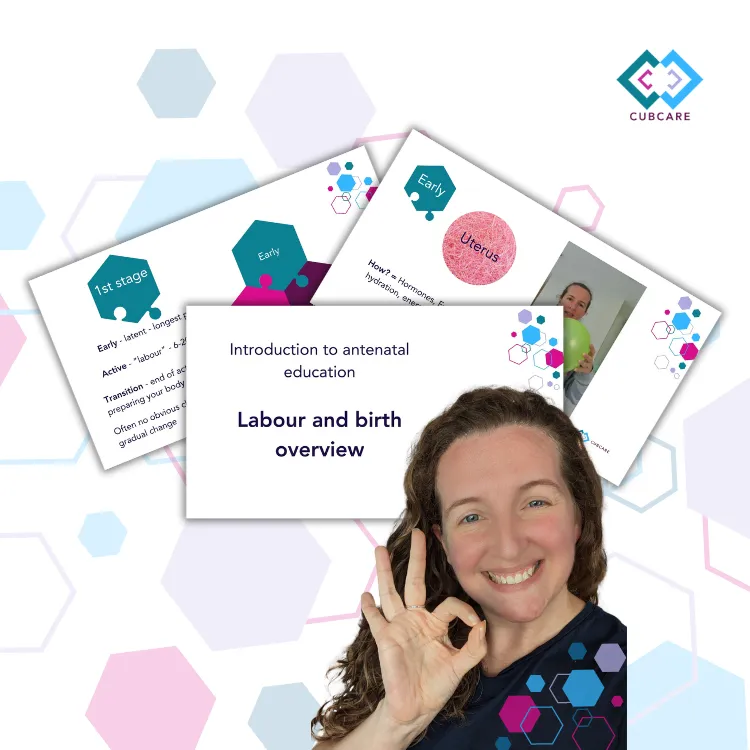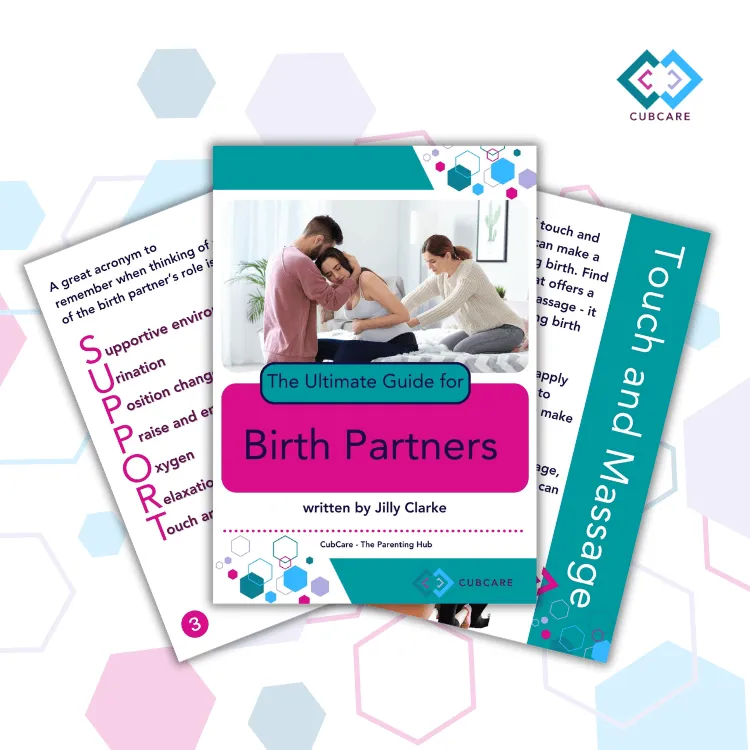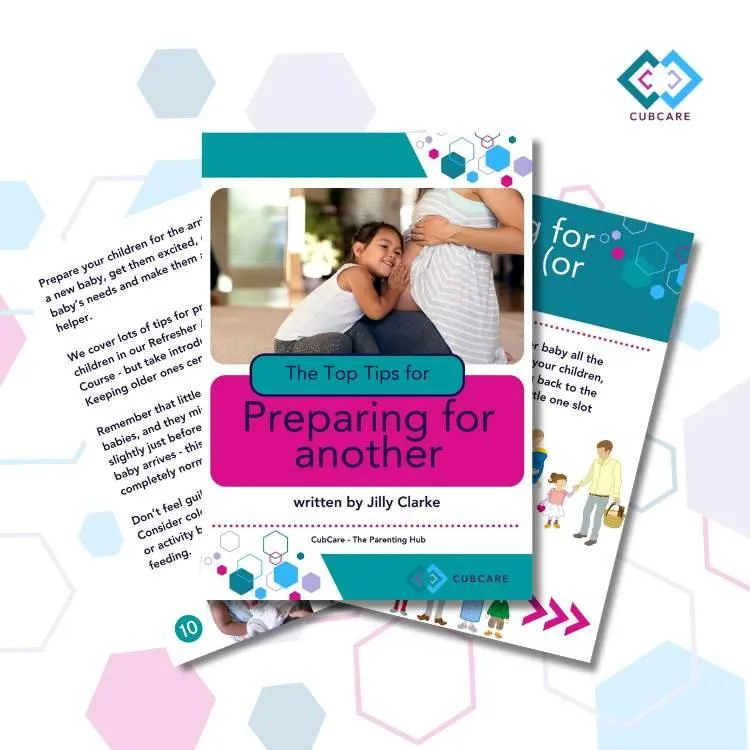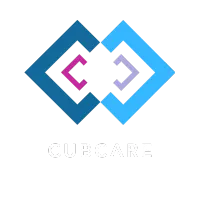We're an award winning Antenatal and Postnatal Education Platform 2025!
(read more here)
CubCare blogs.
From early pregnancy to newborn development.
Advice to help through pregnancy, birth and childhood.
BLOG

Are endorphins good for birth?
"Endorphins are nature's way of empowering the birthing process, offering natural pain relief, emotional calm, and the strength to navigate labour with confidence and ease." - Jilly Clarke
What are endorphins, and why are they important during labour?
You will hear me speaking in class about endorphins, trying to keep the levels of that wonderful chemical as high as possible during labour as they are your body’s natural painkiller, more powerful than morphine. This is a natural chemical produced in the body and contains none of the side-effects associated with medical drugs. Endorphins help relieve pain, reduce stress and improve your sense of well-being.
Surely it makes perfect sense to be boosting this chemical within the body during pregnancy and birth rather than reaching for the medical drugs? Working on boosting this chemical during your pregnancy can also help your perception of discomfort during your labour – the very definition of the term practice makes perfect!
Knowing what things to do if birth starts to feel tricky can really help you to manage the birth experience. Good antenatal education can help you build that knowledge so things come naturally on the big day.
Endorphins are also produced whilst breastfeeding and present in breastmilk too. Boosting your endorphin levels after birth using some techniques below can encourage this further. These endorphins are beneficial for baby in helping with the stressful transition to life outside the womb. They are also helpful to relieve any pain or discomfort from the birth, early breastfeeding and any medical procedures they endure in their early life.

Understanding endorphins in labour
Endorphins are neurotransmitters produced by the body to help manage pain and create a sense of well-being. Often referred to as the body’s natural painkillers, they are part of the brain's response to stress and physical exertion, including the physical intensity of labour. As contractions increase, the body releases higher levels of endorphins to help women cope with the discomfort of childbirth.
During labour, endorphins act as a powerful tool, helping mothers manage sensations and even promoting feelings of calm and euphoria. Research suggests that high endorphin levels can increase a your pain threshold, making contractions feel less overwhelming and more manageable. In fact, the more intense the labour, the more endorphins the body produces, creating a built-in mechanism to handle the rising levels of physical exertion.
These natural pain-relieving hormones also work to enhance emotional well-being during childbirth, reducing anxiety and encouraging a sense of empowerment and control during the birthing process . By tapping into this natural system, you can find yourself more able to cope with the stresses of labour, especially in environments that support a calm and positive birth experience.
Endorphins and oxytocin - hormones that need to work together
Endorphins and oxytocin are two key hormones that work hand-in-hand to support an effective and empowering labour. Oxytocin, often called the "love hormone," is responsible for stimulating contractions and facilitating the progress of labour. As contractions intensify, the body responds by producing endorphins, which act as natural pain relievers. This partnership between oxytocin and endorphins helps keep labour moving forward while managing discomfort.
When oxytocin levels rise, contractions become stronger and more regular. In turn, higher endorphin levels are released to ease the sensations of pain and stress that accompany these intensified contractions. This balance is vital—not only do the endorphins make contractions more manageable, but they also help sustain a steady rhythm of labour. By keeping pain in check, endorphins allow the body to continue working efficiently, maintaining the flow of oxytocin and ensuring that labour progresses as it should.
This synergy between the two hormones creates a positive feedback loop: as oxytocin strengthens contractions, endorphins rise to relieve pain, allowing the body to labour effectively without overwhelming stress. When supported in this way, mothers can experience a smoother, more natural progression of labour, ultimately leading to a more positive birth experience.
How artificial oxytocin can slow the production on endorphins
As contractions intensify, both oxytocin and endorphins typically rise at similar rates, enhancing the body's ability to cope with the increasing sensations of labour. This natural progression helps you to remain more relaxed, often reducing the need for pain relief medications.
Artificial oxytocin that can be used to boost contractions, however, has a significant limitation: it does not cross the blood-brain barrier.
This barrier serves as a protective shield for the brain, meaning that while Pitocin can effectively stimulate contractions in the uterus, it fails to influence the brain's natural pain-relieving mechanisms. Contractions will be intensified by the artificial oxytocin, but the body's ability to deal with the increased sensation by producing more endorphins is dulled because the brain doesn't recognise the artificial oxytocin as oxytocin.
In contrast, the body’s own oxytocin, released during labour, can cross this barrier, promoting the production of endorphins that provide essential pain relief and emotional support.
When artificial oxytocin is introduced, it can create a more rapid onset of contractions, which may lead to heightened discomfort and stress. This stress response can further inhibit the production of endorphins, disrupting the natural balance needed for a smooth labour experience.

How can we boost endorphins during labour?
Boosting endorphins during labour can make a significant difference in how you experience birth. Since endorphins are your body’s natural pain relievers, promoting their production can help reduce discomfort and create a sense of calm. Simple practices like staying active, using rhythmic breathing, and creating a peaceful environment with dim lighting or soothing music can naturally increase endorphin levels. By consciously supporting your body’s endorphin flow, you can work with the natural rhythm of labour, making the process smoother and more manageable.
Ways you can boost endorphins during labour:
Exercise. Movement. Dancing, swaying, staying upright and moving around when your body tells you to.
Laugh – they do say that laughter is the best medicine!
Listen to music.
Massage – light pressure massage is perfect for releasing endorphins, but firmer pressure holds are also wonderful
Get acupuncture. Or learning acupressure stimulating techniques for labour.
Eat dark chocolate.
Get close to your partner – intimately, or with a cuddle and a kiss – bonus points for lingering in a cuddle for more than 20 seconds to release oxytocin too!
Meditate. Using the deep, breathing techniques that we use at CubCare is perfect for this. Using them alongside visualisations and relaxations from class and you are on to a winner.
Aromatherapy – there are certain scents that are perfect to boost endorphins as well as to help stimulate labour. It is certainly worth looking into.
Learning how to relax during the pregnancy so that you are ready when the big day comes is vital. A relaxed body does not secrete adrenaline, and allows the endorphins and oxytocin to flow.
Remember, our bodies are SO capable. With the trust, the knowledge and the education you CAN have an amazing birth experience.
That's why we have our Antenatal Course (both in person and online), Refresher Antenatal Course (both in person and online), and our Birth Partner course so that everybody can get knowledgeable and confident for birth.
Refresher Antenatal Course in person
Refresher Antenatal Course online
Birth Partner course (included in our Antenatal course)
Antenatal Course in person
Antenatal Course online
Easily navigate to our most popular Blog categories
Download our Freebies

Labour and Birth
Watch our introduction to antenatal education webinar, our labour and birth overview - to start your antenatal education journey. Understanding the process, and what you can do to influence it.

Pregnancy Planner
Free Pregnancy Planner to help you prepare for a little one. Prepare your body, your mind, your finances and your home. Get organised, feel good and prepare for an active, positive birth.

Birth Partner Guide
Your ultimate guide to being the best birth partner during pregnancy, birth and recovery. Learn what you need to do, and what you need to learn to be the best birth partner possible.

Expecting Again Guide
Your ultimate guide to preparing for another birth and an extra baby. Our top tips for navigating pregnancy and birth, and helping your older ones to transition into their new role as a big sibling.
Based in Welwyn Hatfield, offering local pregnancy support and doula services across Hertfordshire: St Albans, Hatfield, Welwyn Garden City, Potters Bar, Stevenage, Harpenden, Hitchin, Barnet, Mill Hill and surrounding areas.
Online antenatal and postnatal education available UK-wide.
© Copyright 2025 CubCare The Parenting Hub. CubCare is operated by The Birth and Baby Company Ltd. Company No. 15655287
Privacy Policy | Terms & Conditions | Medical Disclaimer | Inclusivity and Accessibility

